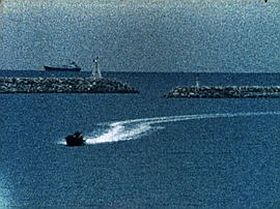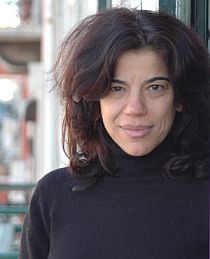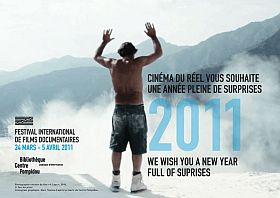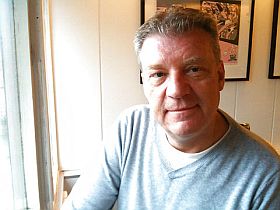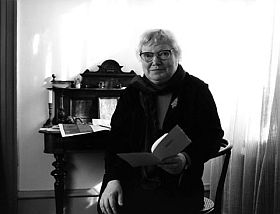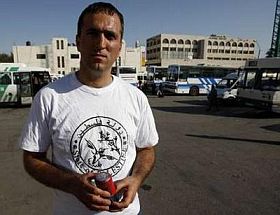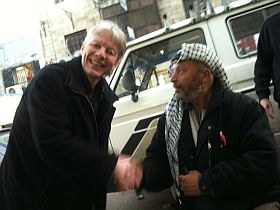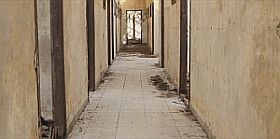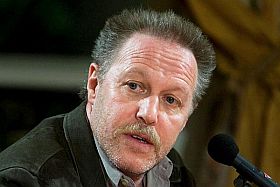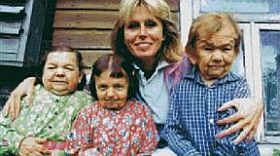I can not think of any European documentarist who has this sense of making beauty out of everyday life as it is being lived by us ordinary people… (Tue Steen Müller)
LA VILLE DE LOUVRE (1989)
by Tue Steen Müller
Produced 20 years ago, this masterpiece of Nicolas Philibert is as fresh as on the day of release. It is a fascinating look at what happens behind the scene at the magnificent museum in Paris. At the end of the film Philibert summarises what was his intention, by showing a long sequence of faces of some of the people, the viewer meets in the film. Yes, he is after people and what people do in an adventurous and sometimes mysterious place like Louvre where he (also) takes us underground to all the art works that wait to be exhibited or never reaches the exhibition area. It is transport, cleaning, restoring and conserving, and guarding, and playing boule on Rue de Rivoli next to the museum, measuring, planning the placement of the paintings in a room before the opening. And so on and so forth, several magical moments, lots of humour, all born by a fascination from the side of the film team. And you sense the director’s écriture right away, as you know it from La Moindre des Choses, Le pays des sourds, Etre et Avoir…
Philibert wast originally only hired to film one of the complicated transports, but stayed in the museum for another 3 weeks filming without any permission before getting this, and a producer and financing… I wanted to avoid bureaucracy, Philibert says in the bonus interview on the dvd (Éditions Montparnasse). Nobody actually had problems with us hanging around, as they already knew us. The film is a beauty because of the constant thinking in images, and the total concentration, as he also says is needed, to be ready to catch important moments, and film small stories that in the final film is cut in the way that you leave a theme and some people to come back to them later.
The film will be shown saturday April 25 on ARTE in connection with the Theme Day dedicated to the 20 years of the Louvre pyramid. (Blogpost April 23 2009)
LA MOINDRE DES CHOSES (1997)
by Tue Steen Müller
Nicholas Philibert is here. Three films have been shown, Le Pays des Sourds, Retour en Normandie and La moindre des choses. Last year the Syrian audience could enjoy Être et Avoir. Philibert did a master class, denied to be called a master, talked for two hours with a lot of charm and commitment, especially about “La moindre des choses”, which is for sure a Master’s Piece. Shot in 1995, the director went to the psychiatric clinic called la Borde, filmed the people in the institution, staff and patients, and followed the rehearsals and staging of a theatre piece by Polish Witold Gombrowicz. What comes out of it is a beautiful hymn to life
and to us, the actors on the big stage of life. Wonderful characters with whom Philibert made a film, as he said, the film is not about but with. A director’s vision and what I admire in this film is the almost caressing rythm of the montage, with which Philibert slowly introduces his gallery of characters.
Constantly looking for beauty… my work consists of creating the conditions for something to happen, he said, this great filmmaker, who masters the art of listnening to the other. I am a documentarian and not a fiction filmmaker, I do not want people to play roles. Maybe I ask them to repeat something or ask if I can be present on a special occasion but they are themselves. (Posting from the festival DoxBox5 Damascus March 9 2009)
EVERY LITTLE THING / La moindre des choses (1997)
by Sevara Pan
Here, the first right is the right to roam. Nicolas Philibert, the acclaimed French documentary filmmaker, largely known for capturing the trivia of the closed worlds (i.e. In the Land of the Deaf, Animals – see MoMA series on his films: “Nicolas Philibert: The Extraordinary Ordinary”), this time pushed the gate of the progressive psychiatric clinic La Borde. Nestled in the vicinity of the sunlit Loire Valley, the film, succintly dubbed as Every Little Thing, portrays the every day life at La Borde, its trivial goings-on, loneliness and feebleness. Yet, there is room for moments of joy and laughter. Set over the summer of 1995, Every Little Thing follows the residents and staff of the La Borde psychiatric clinic as they set out to stage, what has now become a tradition, a fête production of a theatrical play. This year, they mount Witold Gombrowicz’s absurdist classic ‘Operette’.
The film opens with the scene of a woman, alone in a wide shot, singing a piece from the opera ‘Orpheus and Eurydice’, “Mortal silence. Vain hope. What a torment. […] I succumb to my suffering,” she sings apropos as if Christoph Gluck himself had composed it for her. This immediate, somewhat disorienting immersion into the world of La Borde, takes place without an introduction or a context. The slow pacing seems especially fitting for this milieu. Its natural-lit outdoor cinematography appears idyllic and even a tad utopian.
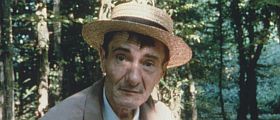
In the following scene, we see a series of alienated body plans wandering in the green space. As we watch them roam, we are suspended in a state of unease and discomfort. Captives of their own bodies, their movements are rowdy and uncoordinated – they are unbridled misfits, displaced, repressed of drive, and rendered to vacillating and haphazard convulsions. Master at finding the right balance between sound and silence in all of his films, in Every Little Thing Philibert too deftly employs silence to signal the storytelling tone. Given the environment, the long silent takes now seem to be rather disturbing than peaceful. Agitated by the wind and trees, the life of its own nature seems to have found a
relief to the agony of the troubled souls. Yet, they do not stagnate, they grow freely, at their own pace and in all directions.
“[…] Scattered, lost. […] But who can tell? Who can tell what? […] Bizarre forms, demented shapes. I don’t know, I don’t understand, I don’t comprehend. Motionless, dazed, confused. […]” As the patients recite the lines from the ‘Operette’ with vigor and anxiety, this Polish absurdist comedy from the mid-60s and its distortive dreamwork seem ideal for La Borde. Caught in the nervous tics and disrupted diction, Michel, one of the long-term patients who regularly stays at the clinic since 1969, alike his fellows, chooses the temporary safety of the art world. He feels protected by the narrow confines of the fictional world of the ‘Operette’, where “the totally illogical lines comfort him.” Embraced by the tranquil woods of the Loire Valley, the La Borde asylum alleges art as a sanctuary and repose, serving both as an act of catharsis and that of defiance.
Above and beyond the theater, Philibert pursues no spectacular shots bestowing the folklore of madness. Neither does he try to encrust the film with new twists and turns. In fact, the film is constructed within a rather basic narrative pattern that eschews an adherence to any complexity of a latent plot or drama. Nevertheless, the timeline tracing the preparation for the play, the final performance, and the aftermath lends itself a narrative cohesion. Obstinately true to his style, the legato unhurried pace gives time to be attentive to the protagonists and their everyday doings. Once we embrace the slow rhythm and gradually get comfortable with it, we find ourselves immersed in these micro-moments that otherwise would have gotten lost in the momentum of the every day life. As the simple atcs unfold in a non-narrated manner, we see people reveal themselves in unpredictable ways. The scattered mosaic of moments is poetically undercut in a complexity of patches – all rendered with a lucent beauty. Yet, when that beauty slips in, it is almost always broken.
Be it, in the garden of La Borde, where a haggard patient strives to walk up to a shrub, rubbing his forehead as if to mollify the unbearable thought that hit his head; or at the art club, where a patient tries to draw the face of another patient, pauses in a moment of panic with words, “I am afraid to miss…” but finally cedes into a grin, overwhelming her suffering – behind these small moments, there is a lot at stake. It is riveting how little can say a lot about people: a stare, a gesture, a sigh, even a smile. Such moments of intimacy resonates with the viewer eminently. It uncovers something essential and profound about the human existence. Yet, what exactly it uncovers is up to the viewer. The film does not contain much commentary, laying itself wide open to the reading. Philibert’s ambition of being “a bit of an anti-Michael Moore” shows its vestiges here as he avoids to give any answers or to “think for the viewer”. Instead, he gives the viewer something to think about.
True to his style, Philibert is not voyeuristic in approaching his subjects. He says, “this film is not about people, but with and because of them.” Throughout the film, it becomes evident that the protagonists are well aware of being filmed. It can be seen through their verbal interventions or gazes directed to the camera. But these scenes don’t end up on the floor of the cutting room. Philibert says, “It doesn’t bother me that they look directly toward the camera. I don’t try to make them forget my presence. It is a matter of making myself accepted, not forgotten.”
As Philibert makes himself accepted in the La Bodre asylum, so do we. Indeed, as we voluntarily immerse ourselves in their world, we become almost as them – mad, too. By gradually taking us into the impenetrable madness, this cinematic vigil makes us re-work our view on madness and extend the degree of ambivalence toward the notion of normality. The film is very shrewd in bringing to focus the fluidity and dynamics of the borderline between madness and sanity. In Every Little Thing, anxiety and fragility are never far behind the laughter, spontaneity, and liveliness. “You are laughing at the rubbish I say. Aren’t you? You are totally crazy,” one of the patients utters. Different expressions race back and forth over his face. His smiles come in succession like waves breaking on the surface of a little lake. “You are nuts, you are completely nuts! […] That poor nurse is crazy. The staff need care. That could happen, you know. […] True, if we get care, no one will look after you.”
Indeed, as all visible differences between the patients and the care-givers are removed and patients are liberated to actively participate in running the facility, it seems hard to distinguish between those who need care. The care-givers do not wear white coats and doors have handles on both sides. Who manages the switchboard, who answers the phone calls, who prepares the meals – each one, notwithstanding their mental status, is a member of the La Borde little community, a microcosm of the society riven by differences and tension. All are in the same boat. Within this closed community, Philibert manages to create intense feelings of both community energy and extreme solitude. He observes the patients both when they are collaborating and when they are alone, estranged and off in their own universe.
As we hear tragic arias, soul-baring confessions, and moving recollections, the film without a condescending pity or soaring valorization, brings an illuminating account of a world that is outside of most of our daily experiences. Philibert approaches his subjects with a deep but unforced empathy that does not exoticize or disown them. In this radical otherness, we see our pallid reflection, we find part of ourselves. The film does not offer an antiodite for our fear of otherness, the otherness would still keep leaking into our psyche. Profoundly disturbing and intensely personal, the last sentence of the long-term patient Michel both moves and terrifies us, “We are here among ourselves. And you are among us, too, now.” France, 1997, 105 mins. (Post June, 27 2013)
ÊTRE ET AVOIR (2002)
af Allan Berg Nielsen
Stedet for dramaet er en lun skolestue med lys og alle tingene på plads, der er hjertet i tilværelsens vinter. Den venter på børnene, og her kan læreren, mens de er hjemme, sidde og rette opgaverne. Åbningen skildrer snevejret (årstiden), vi er på landet (stedet), skolebussen henter børnene (personerne kommer ind). Med ét er vi inde midt i handlingen og inde midt i filmens emne: undervisningen. Vi kommer ikke derfra igen. Dramaet er det banale, som her på stedet er det egentlige. En skildpadde på gulvet, en globus. Livets hastighed i verden. Dag og nat på denne årstid. Tilværelsen universelt. Eksistens er blevet et banalt ord, men her dækker det med ét.
Filmens kerne, dens inderste emne er en grundlæggende opfattelse af sproget som bærer af den franske kultur, som således er essensen af lærerens virksomhed, sådan som filmen tegner den. Filmens eneste interview, en samtale, han har med instruktøren, røber med efternavnet Lopez lærerens spanske baggrund. Faderen kom til Frankrig som ung. Måden, optagelserne blev til på er værd at huske. Der er et filmhold til stede i skolestuen hos børnene. Mikrofonen hænger lige over deres hoveder, og de hvisker følgelig, generte og høflige. Det bliver til filmens meget stilfærdige samvær. Optagelserne strakte sig over 60 optagedage fra december 2000 til juni 2001.
Klippet er konstrueret af lange scener, som alene i deres rækkefølge etablerer dramaet, og filmens billeder illustrerer ikke, de udgør handlingen, fortællerstemmen er fraværende, men tydelig, Philiberts écriture. Hovedinddelingen er årstidernes firedeling, men begivenhederne, som er almindelige, banale og vitalt sitrende, hober sig op før struktureringen. Filmens konstruktion finder vej for os i mylderet. Hurtigt efter åbningen vælges en lille dreng som hovedperson. Han hedder Johann, men i skolen her er han bare Jojo. Hans forhold til læreren og lærerens til ham bliver et bærende motiv filmen igennem. Det er et dramaturgisk greb, det er karakterudvikling. Jojo er den første, som får navn. Læreren nævner hans navn: ”Begynd her, Jojo…” Filmen er i gang, første replik. Det er allerede i filmens åbning. Den første samtale følger kort efter. Det her bliver om Jojo og læreren, lover filmen os i åbningens kontrakt.
En lang optageperiode, en lang tilstedeværelse på skolen, 10 uger fordelt over et halvt år førte Philibert til en yderst personlig opfattelse af det sete, og denne sin indre verden gjorde han til en konstruktion. Sådan er det filmværk, som fremstiller Philiberts skolestue ved hjælp af Jojos. Sådan er Philiberts Être et avoir, som kunne hedde Vivre sa vie, var den filmtitel ikke allerede benyttet. (Filmintroduktion i FOF Filmklub)
BACK TO NORMANDY (2007)
by Tue Steen Müller
It’s countryside again. This time Nicholas Philibert heads forNormandy, where he 30 years ago was the direction assistant of René Allio on the film “Moi, Pierre Rivière”, a “based on a true” story about a young man who in 1835 killed his mother, sister and brother.Pierreleft his memoirs that were studied and written about by French philosopher Michel Foucault – the inspiration for Allio.
Philibert goes back to see the people, who played the roles in the film. Allio wanted people from the region, so called real people, and Philibert was to find them. As he re-finds them now due to his absolutely masterly discreet, warm and interested way of making them feel confident in front of the camera.
I can not think of any European documentarist who has this sense of making beauty out of everyday life as it is being lived by us ordinary people.
What we as an audience get is therefore a multi-layered documentary essay, a reflection on Life and Death as it was interpreted so stylistically perfect in the film of René Allio, from which we see a lot of excerpts AND as it is performed and told about by the people in this countryside today.
Of course there is also a lot of wonderful film memories that are brought forward by those, who played the mother, the father, the sister, the lover – and the son, who has left the region but is found by Philibert and enters the film in the end.
A completely different film from the hands of the man behind “Etre et Avoir”, and yet it is with the same signature, from a director who believes in the image and in looking at life as a gift to be cared about. (October 29 2007 posting from CPH:DOX festival)
NÉNETTE (2009)
by Tue Steen Müller
This is the start: A monkey looking into your eyes, an orangutan’s gaze into the camera. At US, those who are outside the glass. Or just looking into nothing. No sound, or very soft sound from the streets around the Parisian Jardin des Plantes, that has been the home of Nénette, since she was 3 years old. She is now 40, an usual high age for an orangutan. Alone she is, having survived three marriages. They all died, the males. She has children around her, and she gets pills so no incest happens. Because what do we actually know about monkeys and their behaviours, what they think, how they behave, if they are as sad as they look or if this is just something that we on the outside of the glass project into them as we are in need of these emotions?
Nicolas Philibert, master of documentary, celebrated on this site many times, has made this 55 minutes long documentary that never leaves Nénette and uses a voice-off very intelligently. Spontaneous comments from children vary with those from couples, and with thoughtful reflections from so-called experts, anthropologists and from a man who as been working in the Jardin des Plantes for 35 years. Music and a song to the orangutans.
Do you think Nénette understands where she is and who we are, she who has spent her life doing nothing as it is said!
I saw the film on a small computer screen, I look forward to the big screen but I can see that Philibert again has made something special with his fine humanistic, non-intellectual approach to Film and Life. Nénette was looking at him behind the camera, as if the camera was not there, an old wise creature she seems to be and you can’t help feel sorry for her at the same time as you are grateful to have met her. And for a film that brings you in an almost meditative mood. (October 19, 2009 posting from festival DOCLisboa 2009)
NICOLAS PHILIBERT AT MAGNIFICENT7
by Tue Steen Müller
The festival opened with an image of Nénette, the more than 40 years old orangutang that since the age of 3 has been living in a zoo inParis. A close up of someone looking at you and another beautiful film by Nicholas Philibert, whose name here in Serbia is written as it is pronounced: Filiber. Who is a director who talks wonderfully and inspiringly about his métier, in this case about a film that started as a short film of around 20 minutes but ended up as a feature length documentary that has been released theatrically in several countries and is soon published on dvd.
”I had totally free hands”, Fhilibert said in a masterclass for young filmmakers, ”I had no money for the filming, so there was no pressure on me… it is a film about face to face, about our voyerism, about ”the other”. Nénette is a metaphor for ”the other”. We can’t help comparing with her.”
Filiber had some principles that he followed. Sound and image were separated. The camera stays on Nénette and her fellow apes, and are accompanied by 3 types of voices: visitors (several children), keepers and friends, who reflect on several aspects of our relationship to the ape. The sound is important for the film, Filiber said, ”and the silence speaks for her solitude”. He had 10 days of shooting (Nénette wakes up at 8.30am and goes to sleep at 6pm at night), and ”I started with the editing of the sound.” Filiber showed clips from his previous films, ”Le moindre des choses” (photo) and ”La ville Louvre” and mentioned several times how important it is for him to keep his ignorance and work from curiosity and questions. ”I dont want to know anything in beforehand, if I do, then why make the film? All is built on encounters and I only film what people give to me”. (Posting from theBeogradfestival January 27, 2011)
IMAGINATION TAKES FLIGHT
by Nicolas Philibert
I never made the decision to become a documentarian, to place myself in some fixed category. I don’t even like the word “documentarian”. The term is an attempt to give a strict definition to a genre known for its porosity and constantly evolving boundaries; a genre that is almost inseparable from the one it is always opposed to: fiction. After all, images are not as true to ”reality” as they are to the intentions of their creator.
Nevertheless, my first film was a documentary (His Master’s Voice, 1978) and it made me want to make another one and another one, and I’m still as excited as ever. So I have become a documentarian and, although I dislike the word, nothing has managed to quench my thirst for filming; not the efforts needed to get a project started and surmount one’s demons nor the threats that hang over the existence and circulation of one’s most personal works.
I feel the need to create a frame for each film, a starting point that I can build upon. This frame consists of the things that I find motivating and exciting when working together with the subjects of the film. When filming starts, the final destination is unknown to me and I don’t know which path I will follow. A lot depends on the things that emerge through work and encounters. Naturally the journey is different with each film.
Movies always tell something else than what was expected of them and maybe it’s better that way. When I started filming Every Little Thing at La Borde psychiatric clinic, I would have had great difficulty defining the subject of the film. Actually, I still don’t quite know what it is. It is not so much a film about La Borde than a film made because ofLa Borde. I hesitated before starting to make it… When you are holding a camera, you have power over others. It is essential to know how not to abuse this power. When I decided to make this film, it was to confront my fears and hesitations, all these things that were holding me back. Thus the subject in itself is not as important as the questions that the film evokes in me.
When I start making a film, I inform myself as little as possible. The less I know, the better it goes. Besides, if I know too much about a subject, I’m no longer interested in making a film about it. The idea of making a film from an omniscient point of view is completely foreign to me. I prefer to build upon not knowing.LouvreCityis a good example of this: there is not a word of commentary in the film, although the co-producers wanted to add it. When making In the Land of the Deaf, I had decided to dive straight into the oddity of sign language, without an interpreter or other outside help. At first, I felt lost… However, I had decided not to consult experts or doctors or educators. If I had approached the subject that way, the deaf would have felt they were being filmed as research subjects.
Movies must hold their secrets and leave questions unanswered. Shady areas, words left unsaid, the interplay between what is shown and what is not, what is told and what is left to be assumed, invisible parts, reluctant characters; all this moves the viewer and shakes up his or her thoughts and prejudices, allowing imagination to take flight. When everything is smooth, familiar, transparent, tame, soothing and without any roughness or obstacles, there is no story to be told, only stagnation. (Nicolas Philibert: Imagination takes flight. This text is taken from the site of the Finnish documentary film festival Docpoint, 2010. Translation by Heini Lilja. Posted here on filmkommentaren.dk January 16, 2010 by TSM)
LA MAISON DE LA RADIO (2013)
by Tue Steen Müller
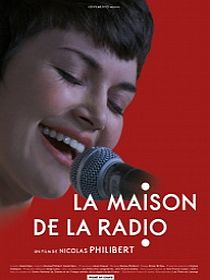
For this blogger Nicolas Philibert is one of the most important documentary directors of out time. Filmkommentaren has written about his films frequently, below you have a link that will take you to ”collected posts” about the French director, who in the 5th edition of the Damascus DoxBox festival in 2009 was reported to have said the following at a master class:
”Constantly looking for beauty… my work consists of creating the conditions for something to happen, he said, this great filmmaker, who masters the art of listnening to the other. I am a documentarian and not a fiction filmmaker, I do not want people to play roles. Maybe I ask them to repeat something or ask if I can be present on a special occasion but they are themselves.”
There is a new film by Philibert at the Berlinale Panorama section. It is presented like this:
”La maison de la radio by Nicolas Philibert, France/Japan.
Creator of images Nicolas Philibert has always been fascinated by the “blind” medium of radio and its ability to fire the imagination. Millions share this passion. For many, radio lends life a rhythm and structure, bringing – between kitchen and bathroom – the world to their homes. With this work, Philibert pays tribute to its diligent makers by bringing the invisible to the screen. And so achieves what every filmmaker seeks.”
The film will be released in April in France. Below also a link to an interview (in French) with the director.
REVIEW
by Tue Steen Müller
Voices, yes voices it will be, communicates Philibert right from the start, before the titles appear on the screen. An hommage to the human voice as it is performed in the public radio of France. Quick sound montage, titles, the building that houses the radio from outside, people walking into it, a working day starts. Voilà, simple, classical.
And then faces, yes, faces it will be, very often close-ups of faces, people who are alone in a studio with the microphone very close to their lips, or faces concentrated on listening to voices which are being recorded. Can be literature, news, talk or quiz shows with people who call the radio, or we, the audience, are invited to attend an editorial meeting, what is important, which choices do we make.
Philibert chooses his characters and situations, he goes from one to the next but he comes back and thus give us the illusion of getting to know the characters better. We do and we experience the development they make in the music recording studio with the opera singer or with the beautiful young singer you see on the poster. Yes, Philibert falls in love with his characters, he has always done so, be it an orangutang (Nenette) or a human being. He is basically an observational documentarian but his presence and influence on the scene he is shooting, mixed with his ambition to make us viewers have ”the feeling of being there” (to quote master Leacock again again again…) makes it impossible to resist the joyful tone that he offers.
He leaves the radio building once in while. He goes with the nerd who records sounds in the nature, and he lets us see and hear the studio recording of the sound of peeling a potato(!) or be with a man, who plays a home-made sound machine, experimental music you might argue, but an artist in action, indeed.
You are in constant good company with this film and for one who enjoys listening to clever people with good language and beautiful voices in the radio (we have that in Denmark as well, in a country where television mostly is tabloid blablabla) during summer time (in the allotment garden), you appreciate the film even more. Having said so, this is not another highlight from Philibert, is does not have many layers but joyful and playful it is, masterly montaged and photographed, that’s quite a lot! You sense that he has enjoyed having been behind the walls of sound!
France, 2013, 100 mins. (Posted May 27, 2013)
http://www.filmsdulosange.fr/en/
http://www.filmsdulosange.fr/en/film/13/la-maison-de-la-radio
http://www.telerama.fr/cinema/nicolas-philibert-realise-un-documentaire-sur-la-maison-de-la-radio,71515.php



